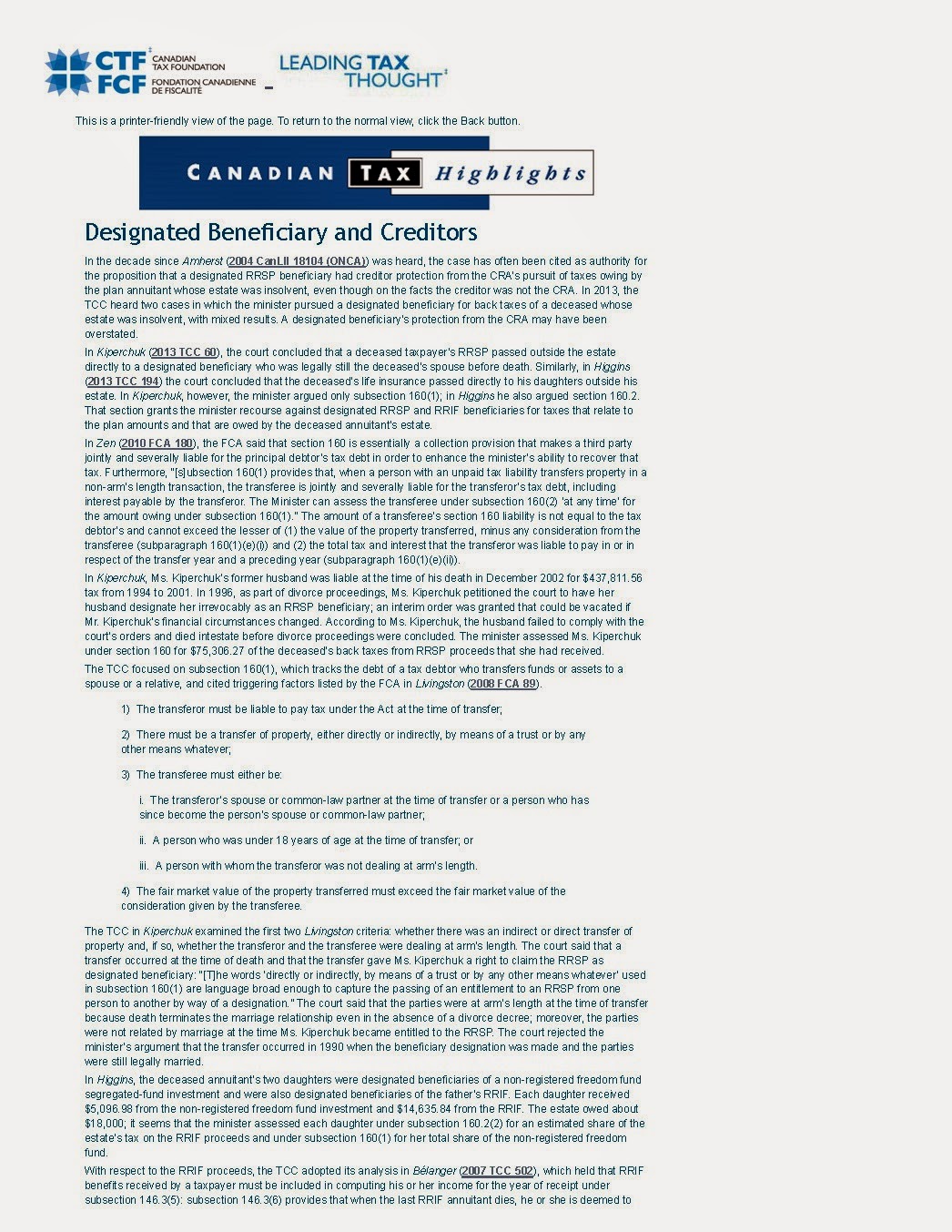This article was written also in 2013 by Professor Darcy MacPherson and myself was triggered by the thought that a criminal act by a partner in an accounting partnership or a legal partnership could extend to the other partners vicariously. Here are our thoughts:
Although the lawyer in Guidon (2012 TCC 287) was a sole practitioner, the TCC's decision to characterize the section 163.2 penalties
as criminal raises the question of whether a criminal penalty can
extend to the partners of an adviser who is charged. Tax advisers who
practise in a partnership should be cognizant of the potential reach of
section 163.2 of the Act and the fraud provisions in the federal
Criminal Code (Bill C-45, effective March 31, 2004).
A partnership comprises two or more persons who
carry on a business together with a view to profit; it is not a separate
legal entity, and every partner in a general partnership is deemed to
be an agent of both the general partnership and the other partners. The
doctrine of vicarious liability governs partners, and the courts have
not hesitated to apply section 11 of the Ontario Partnerships Act in
imposing civil penalties on a partnership because of the negligent
actions of one partner. In Allen v. Aspen Group Resources Corp.
(2012 ONSC 3498), the Ontario Superior Court concluded that the
language of section 11 was broad enough to encompass the statutory wrong
of misrepresentation created by section 131 of the Ontario Securities
Act. However, Canadian and English courts have rejected a common-law
doctrine of vicarious liability for a criminal offence on the principle
that one should be held criminally responsible only for one's own
criminal wrongdoing. Statutory law in Canada has sought to remedy that
position by extending the potential imposition of criminal liabilities
on partnerships.
Although
a general partnership does not have a separate legal identity, it is
subject to the Criminal Code and to the Act. For example, the preparer
penalties with which the lawyer was charged in extend to a partnership. The lawyer in that case was assessed under the subsection 163.2(4) preparer
penalty, which provides that "[e]very person [specifically defined to
include a partnership] who makes, or participates in, assents to or
acquiesces in the making of, a statement to, or by or on behalf of,
another person . . . that the person knows, or would reasonably be
expected to know but for circumstances amounting to culpable conduct, is
a false statement that could be used by or on behalf of the other
person for a purpose of this Act is liable to a penalty in respect of
the false statement." Culpable conduct is defined in subsection
163.2(1) to mean an act or a failure to act that (1) is tantamount to
intentional conduct; (2) shows an indifference to whether the Act is
complied with; or (3) shows a wilful, reckless, or wanton disregard of
the law.
Under the Bill C-45 amendments to the Criminal
Code, the actions and mental state of a partnership's senior officers
determine whether it has committed a prohibited act or has the requisite
mental state (sections 22.1 and 22.2). A senior officer is defined to
include any person who plays an important role in the establishment of a
partnership's policies or is responsible for managing an important
aspect of the partnership's activities (section 2). A partnership is
liable for an offence requiring proof of mental fault other than
negligence if (1) a senior officer is party to the offence, (2) a senior
officer has the intent to commit the offence but causes a subordinate
to carry out the offence, or (3) a representative is about to carry out
the offence and the senior officer has knowledge of the act but does not
stop it (section 22.2).
Even if the promoter in
had been found to be a partner of the lawyer charged, the relevant
facts occurred in 2001 before the effective date of Bill C-45 in 2004:
criminal law has no retrospective application. However, the courts now
have to consider the fate of an innocent partner of a partnership
charged with a criminal penalty based on the Code and on the Act, which
seek in certain circumstances to impose criminal liability on a
partnership's members.
A
partnership is generally considered to be a collective of all of the
business's partners. Are partners innocent if they are uninvolved in the
criminal activities? Whose money is at risk? (A partnership has no
separate legal personality, and thus there is no partnership money per
se.) Can the personal assets of a partner who is not involved in the
offence be seized to pay the fine assessed by the court against the
partnership? Can that partner claim the presumption of innocence? Is the
imposition of criminal liability on an innocent partner a violation of
freedom of association under the Charter? Can the criminal law attribute
separate legal personality to a partnership for these limited purposes?
Exploring
these questions is beyond the scope of this article, but they must be
considered and acted on when a client's interests are at risk.
Practically speaking, the inherent uncertainties in this area may create
a unique opportunity for tax preparers and promoters to structure their
operations to adequately allocate the risks associated with their
activities. It may be possible to achieve this allocation through the
isolation or quarantine of the partners and employees who engage in
higher-risk promotion and other activities that may potentially attract
liability under section 163.2. The challenges related to these uncertainties may alter the manner in which partners carry on business.










